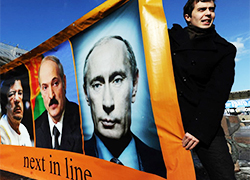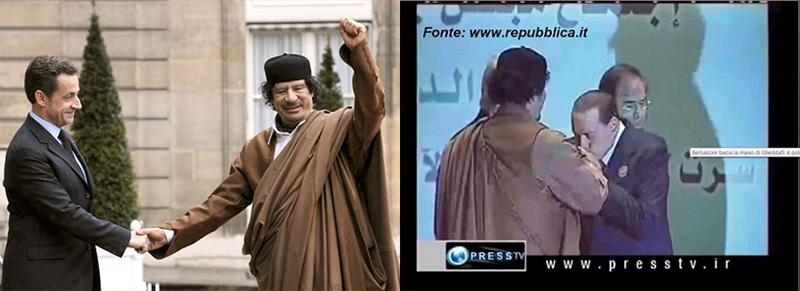Stop kissing dictators’ hands
- Natallia Radzina
- 23.07.2014, 13:13
- 6,380

The Belarusian regime exchanged a political prisoner to three KGB officers, two prosecutors and Yarmoshyna’s friend.
I couldn’t write this text for a long time, and the real reason for that became clear to me yesterday. I have written so many articles criticizing Europe’s approach to Lukashenka’s dictatorship in Belarus that sometimes I feel like I’m hitting my head against an invisible wall. But we have no right to be tired, I guess.
One month ago the Belarusian dictator released one of the most well-known political prisoners, director of the human rights center Viasna, vice-president of the International Human Rights Federation Ales Bielatski. Even though the entire world spent three years fighting to free this human rights advocate, he left prison only when his release became beneficial for Lukashenka. It was done in a hurry, on the same day when the ruler signed a new amnesty law. The political prisoner left the reformatory in an ambulance that went straight to the railway station. He took off with the first train. This is a normal routine of liberation of famous political prisoners in Belarus.
The European Union and the U.S.A. welcomed the release of the prisoner of consciousness, but it was clear that the Belarusian dictator craved more. Lukashenka has been trading his political hostages with the West quite successfully during his 20-year long presidency. He has managed to turn living people to profitable goods. The world paid for prisoners of consciousness with removal of sanctions against the ruler and his team, with foreign loans and smart deals.
This is exactly what has happened this time. Three weeks after the release of Ales Bialatski, the European Union removed visa sanctions against former KGB deputy chairmen Nikolai Svorob and Piotr Tretyak, former director of KGB governmental relations Igor Voropaiev, and a number of officials that were involved in the falsification of the results of the recent presidential elections: Valery Berestov (in 2010 – chairperson of the Mahiliou regional electoral commission), Natalia Bushnaia (in 2010 – a member of the Central Electoral Commission), Andrei Migun (public prosecutor at the trial of the activists from NGO Partniorstvo [Partnership]), Anna Samoliuk (former judge of the Frunzienski district court in Minsk who tried the participants of the protest rally against the falsification of the result of the elections 2010).
Moreover, the name of former deputy attorney general Aleksandr Arkhipov, who had been the Minsk region attorney before the elections 2010, disappeared from the EU’s “black list”. As the Minsk region attorney, Arkhipov refused to open a criminal case after the death of founder of the website charter97.org Oleg Bebenin. Afterwards, the official was promoted to deputy attorney general and made the EU sanction list after breaking the opposition rally on December 19 and prosecuting its participants.
The removal of the sanctions against Arkhipov is, in fact, not particularly alarming. Recently he has been arrested by his own colleagues on Lukashenka’s order and sentenced to a 6-year imprisonment. Rats devour each other, a common practice nowadays.
Nevertheless, the rest of the people on the list are still free and might have already left to Europe, for vacation or shopping. Why were sanctions removed from them? Has the statute of limitations already run out?
Prosecutor Andrei Migun took part in the reprisal of the activists of Partniorstvo in 2006. Four of its leaders were convicted and spent from six months to two years in prison. 8 years have passed since then. Has the prosecutor made a public statement and acknowledged his wrongdoing? Has he apologized to the political prisoners? No, he has not. He is still working in the same field. Two years ago Andrei Migun received the award from the Belarusian Union of Lawyers ”for fruitful and effective participation in the work of the Union of Lawyers” dedicated to the 90th anniversary of the Public Prosecutor’s Office of the Republic of Belarus. Today he can celebrate another acknowledgement: Migun got a Schoengen visa and a trip to the Vilnius mall Acropolis for his “fruitful and effective contributions” to the operation of the repression machine.
Other two names on the list are Valery Berestov and Natalia Bushnaia, both responsible for falsification of the presidential elections.
Member of the Central Electoral Commission headed by odious Lidiya Yarmoshina, laureate of the award of the Minsk Municipal Executive Committee and awarded teacher Bushnaia still is the headmaster of the prestigious Francysk Skaryna gymnasium number 1. She keeps on working to spread knowledge among children, and she will make sure that next year the numbers at the voting station located in her school will be correct.
Berestov is another guardian of the “favorite” of all elections in Belarus. During local electoral campaigns of 2014, marked by fraud as usual, he was the chairman of the Mahiliou regional electoral commission.
It seems as European authorities are eager to help these people have a relaxing summer vacation at European resorts before the coming stress of the elections 2015 when the country will vote for Lukashenka.
The situation is much more complicated with former KGB deputy chairmen Nikolai Svorob (deputy chairman of economic security and anticorruption department, the same department that works against political opponents of the regime) and Piotr Tretyak (deputy chairman of investigation department), and with former director of KGB governmental relations Igor Voropaiev (director of department responsible for wiretapping of authorities, businessmen and opposition activists). These KGBists have vanished off the face of the earth. Official sources say nothing about their new posts or occupation.
I talked to retired KGB lieutenant colonel Valery Kostko and he confirmed my thoughts. As a rule, high ranked people leave the Belarusian special services for the tranquil world of big business, mostly often taking OH&S and HR positions in finances or oil and gas in Belarus or Russia. In other words, Svorob, Tretyak and Voropaiev have crawled from one trough to another. Who knows, maybe you can meet them at the seaside in Nice or in Boulevard de la Croisette?
We all were rejoiced by the good news: apparently, Belarusian Foreign Minister Vladimir Makei, former head of Lukashenka’s administration, one of the organizers of the bloody events of 19 December 2010, is going to Brussels to take part in the summit of foreign ministers of the Eastern Partnership members. The person behind the tortures of presidential candidates will get another opportunity to tell European bureaucrats in his excellent English that there are no political prisoners in Belarus, and that no other country in Europe or anywhere else in the world is as democratic as Belarus.
Meanwhile, Belarus is covered by the net of concentration camps and prisons. Political prisoners, including presidential candidate Nikolai Statkievich, are still behind the bars. All these people have to exist in conditions that can be described as tortures: they are threatened with rape, starved, locked up in isolation wards, set upon each other, they cannot receive letters from their families, cannot meet them, they are forced to do hazardous jobs.
As a former political prisoner, I can testify even before the Haag tribunal: the penitentiary system in Belarus is not much different from that of the Stalin camps. In the KGB investigation isolation cell, political prisoners were stripped naked, forced to stay outside in the cold for hours, beaten up, put on chain as animals. In prisons, the conditions are extremely poor, food extremely bad. The years of imprisonment destroy one’s health completely. Just ask former political prisoner Nikolai Avtukhovich who hardly survived five years of this hell. When the conditions in the prison became unbearable, he had to cut his belly open with a razorblade. Or ask former minister of foreign trade relations Mikhail Marinich who was near death after a stroke he had in prison that left him disabled. You can even ask presidential candidate Andrei Sannikov arrested together with his wife; during many months of his conviction, the regime was pushing him to commit a suicide.
The ordeal of Belarusian political prisoners does not end with a release. They remain under so called preventive observation. Many of them are not allowed to travel abroad, even for medical treatment. They have to live in fear of another arrest. Any effective political activity is impossible. Many former political prisoners cannot even tell about their dreadful time in prison because they are pressed and intimidated by the special services. They are thrown back to prisons, over and over again, like parliamentary deputy Andrei Klimov, youth activists Vasily Parfionov, Vladimir Yaromionok and Aleksandr Molchanov.
However, it is not only political prisoners who become the object of repressions. The entire society is at risk. Thousands of former CEOs, public authorities, employees of defense institutions, businessmen and heads of the country’s different regions are behind the bars. Approximately 20 000 people are kept in places that in fact are concentration camps, but that are mockingly called “rehabilitation and prevention dispensaries”, for alcohol abuse. It is a purely Belarusian phenomenon; it doesn’t exist even in Russia.
Mass “cleansings” affect all layers of the active society. While the opposition tries to raise the issue of political prisoners, the fate of other victims of repressions is basically unknown.
Lukashenka has not faced any real punishment for these crimes. Neither kidnapped and murdered opposition leaders, nor hideous tortures and extremely high mortality in the Belarusian prisons and concentration camps have made headlines or become a subject for a broad discussion anywhere in the world or in international organizations. Visa sanctions were launched against Lukashenka and his authorities, business activity of some of his oligarchs was limited in Europe. And that’s it.
What has happened recently was a simple trade of human rights activist Bialatski to top officers of the KGB, forgers of elections and corrupted prosecutors, although European authorities are trying to create a different picture. This is Europe’s message to the Belarusian society.
I do understand that the West has neither time nor will to fight Lukashenka right now, during the Russian-Ukrainian war. Meanwhile, Europe, so determined to “preserve stability no matter who the partners are”, is now casting a friendly eye on him hoping that in this war, the last dictator might take the side of Euromaidan.
However, do you remember Nicolas Sarkozy, the French president guided solely by his country’s strategic interests, shaking hand of Libya’s dictator Muammar Gaddafi? Do you remember Italian prime minister Silvio Berlusconi kissing this hand? Where is Gaddafi now? Where are Sarkozy and Berlusconi? The first is in hell, the other two under investigation.

Unethical trade and obscure deals with dictators, terrorists and murderers have a bad impact on the European leaders’ political karma, to say the least. Their attempts to create a “stability curve” from dictator regimes have already resulted in the deadly political fires from Tripoli to Lugansk.
Natallia Radzina, editor-in-chief of charter97.org









